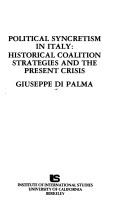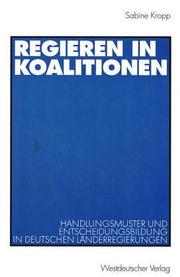| Listing 1 - 10 of 136 | << page >> |
Sort by
|
Book
ISBN: 0429748787 0429748779 0429422377 Year: 2020 Publisher: Abingdon, Oxon ; New York, NY : Routledge,
Abstract | Keywords | Export | Availability | Bookmark
 Loading...
Loading...Choose an application
- Reference Manager
- EndNote
- RefWorks (Direct export to RefWorks)
"Through examination of parliamentary governments in twelve countries, this book demonstrates the ways in which study of the parties in governing coalitions, and their parliamentary opposition, provides insight into numerous aspects of countries' cultural values, societal schisms, and the issues of greatest contention among its people. Each chapter analyses the political parties in a different country's parliament and illustrates how they represent the country's competing interests, social divisions, and public policy debates. Coalition and opposition parties are also shown to reflect each country's: political institutions, political actors, political culture, societal, geographic, and ideological rifts. In many of the countries, changes in the constellation of parties in government are emblematic of important political, social, and economic changes. This book will be essential reading for students of parliamentary government, political parties, electoral politics and, more broadly, to comparative politics"--
Book
ISBN: 0030813980 9780030813986 Year: 1970 Publisher: New York: Holt, Rinehart and Winston,
Abstract | Keywords | Export | Availability | Bookmark
 Loading...
Loading...Choose an application
- Reference Manager
- EndNote
- RefWorks (Direct export to RefWorks)
Book
Year: 2008 Publisher: [Washington, D.C. : World Bank,
Abstract | Keywords | Export | Availability | Bookmark
 Loading...
Loading...Choose an application
- Reference Manager
- EndNote
- RefWorks (Direct export to RefWorks)
"Political economy explanations for fiscal profligacy are dominated by models of bargaining among organized interest groups over group-specific targeted benefits financed by generalized taxation. These models predict that governments consisting of a coalition of political parties spend more than single-party regimes. This paper presents an alternative model-that of populist pressure on political parties to spend more on the general public good, financed by costly income taxation-and obtains the opposite prediction. According to this model, public spending and taxes are lower under coalition governments that can win elections more cheaply. Indeed, in order to win elections, coalition partners need to satisfy a smaller share of swing voters than does a single-party government that enjoys narrower support from its core constituency. A coalition government therefore spends less on the public good to capture the share of the swing vote necessary for re-election. Using data from more than 70 countries during the period 1970-2006, the paper provides robust supporting evidence for this alternative model. "--World Bank web site.
Book
Year: 1963 Publisher: Washington, D.C. : American Enterprise Institute for Public Policy Research,
Abstract | Keywords | Export | Availability | Bookmark
 Loading...
Loading...Choose an application
- Reference Manager
- EndNote
- RefWorks (Direct export to RefWorks)
Book
ISBN: 062094403X 9780620944038 9780620938594 0620938595 Year: 2021 Publisher: Soshanguve, South Africa
Abstract | Keywords | Export | Availability | Bookmark
 Loading...
Loading...Choose an application
- Reference Manager
- EndNote
- RefWorks (Direct export to RefWorks)
This book explores the dynamics and future of coalition governments in South Africa, particularly in metropolitan areas from 2016 to 2021. It provides insights into the political shifts following the 2016 local government elections, which marked a significant change in the power structure, with the African National Congress (ANC) losing control over several metros and forming coalitions with opposition parties. The author, Mzwandile Masina, reflects on these developments, drawing from his experience as the Executive Mayor of Ekurhuleni. The work aims to analyze the implications of coalition governance on South Africa's political landscape, highlighting lessons learned and preparing for future elections. It is intended for policymakers, political analysts, and individuals interested in the evolution of South African politics.
Book
Year: 1963 Publisher: Washington, D.C. : American Enterprise Institute for Public Policy Research,
Abstract | Keywords | Export | Availability | Bookmark
 Loading...
Loading...Choose an application
- Reference Manager
- EndNote
- RefWorks (Direct export to RefWorks)
Book
Year: 2008 Publisher: [Washington, D.C. : World Bank,
Abstract | Keywords | Export | Availability | Bookmark
 Loading...
Loading...Choose an application
- Reference Manager
- EndNote
- RefWorks (Direct export to RefWorks)
"Political economy explanations for fiscal profligacy are dominated by models of bargaining among organized interest groups over group-specific targeted benefits financed by generalized taxation. These models predict that governments consisting of a coalition of political parties spend more than single-party regimes. This paper presents an alternative model-that of populist pressure on political parties to spend more on the general public good, financed by costly income taxation-and obtains the opposite prediction. According to this model, public spending and taxes are lower under coalition governments that can win elections more cheaply. Indeed, in order to win elections, coalition partners need to satisfy a smaller share of swing voters than does a single-party government that enjoys narrower support from its core constituency. A coalition government therefore spends less on the public good to capture the share of the swing vote necessary for re-election. Using data from more than 70 countries during the period 1970-2006, the paper provides robust supporting evidence for this alternative model. "--World Bank web site.
Book
Year: 2019 Publisher: Washington, DC : United States Institute of Peace,
Abstract | Keywords | Export | Availability | Bookmark
 Loading...
Loading...Choose an application
- Reference Manager
- EndNote
- RefWorks (Direct export to RefWorks)
"Most negotiated peace settlements since the 1990s have featured some aspect of power sharing, including those in Northern Ireland, Burundi, Bosnia, and Nepal. However, by freezing a sometimes unstable status quo, power sharing can create challenges to maintaining peace over the longer term as issues arise that rekindle enmity or create new suspicions among the parties. This report argues that power-sharing arrangements can be made more durable by providing robust forums, either permanent or ad hoc, that allow parties to resolve differences as they arise and to reaffirm their commitment to peace" -- Publisher's web site.

ISBN: 9780877255079 0877255075 Year: 1978 Publisher: Berkeley: University of California. Institute of International Studies,
Abstract | Keywords | Export | Availability | Bookmark
 Loading...
Loading...Choose an application
- Reference Manager
- EndNote
- RefWorks (Direct export to RefWorks)

ISBN: 3531135740 Year: 2001 Publisher: Wiesbaden Westdeutscher Verl.
Abstract | Keywords | Export | Availability | Bookmark
 Loading...
Loading...Choose an application
- Reference Manager
- EndNote
- RefWorks (Direct export to RefWorks)
| Listing 1 - 10 of 136 | << page >> |
Sort by
|

 Search
Search Feedback
Feedback About UniCat
About UniCat  Help
Help News
News